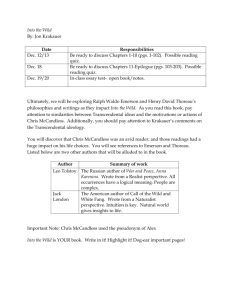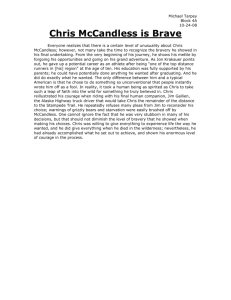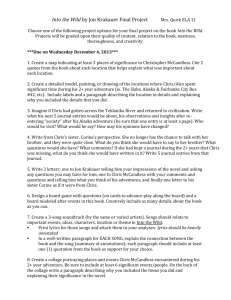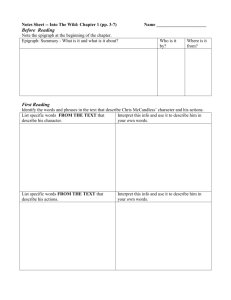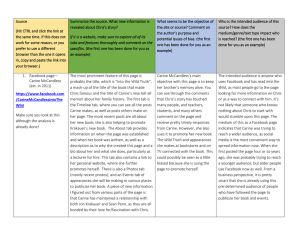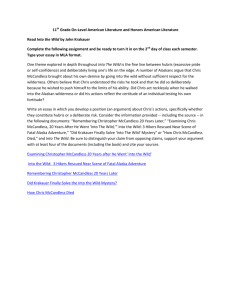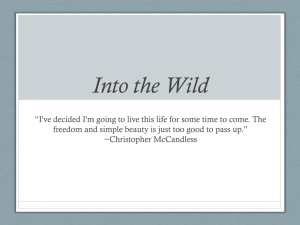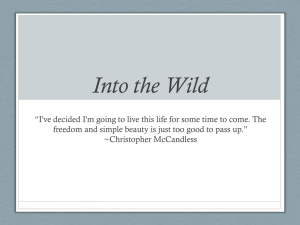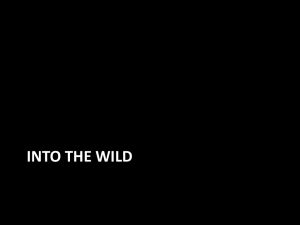INTO THE WILD By
advertisement
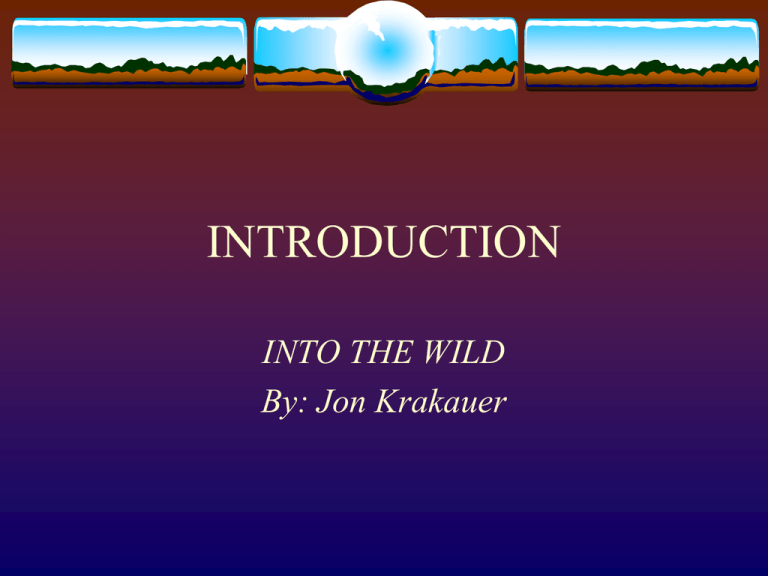
INTRODUCTION INTO THE WILD By: Jon Krakauer Focus We will be looking at ONE STORY (the true story of Chris McCandless’s life and death) and seeing what new information is presented, and how the focus of the story changes, when it is presented in different genres/pieces of media by different people. We will begin with the non-fiction book Into the Wild by Jon Krakauer, which is the most well-known and comprehensive piece about Chris’s story. Focus continued We will focus on media issues such as: -how bias (personal opinion on the part of the author) affects a story -the differing structures of written vs. visual texts (like films) -conventions of technological and print mediums (website vs. books) -the intended/target audience of different kinds of texts -the purpose of different kinds of media and how they influence people’s opinions Origins of the book Into the Wild is a non-fiction text published in 1996 that tells a real life story. Do not refer to it as a novel. Novels are fiction. It is similar to a biography but does not go in chronological order. It is more like a written documentary. It is based on an article that Jon Krakauer wrote about Chris McCandless in 1993 for Outside magazine, titled “Death of an Innocent”. It generated so much interest, that he decided to turn it into a book – Into the Wild – which he spent three years researching and writing. Synopsis: Chris was a young college graduate who went off to Alaska in search of a life without the trappings of money and his upper-class upbringing. His death is known from page 1 of the book, as this is a true story. As we read, we will try to uncover the reasons why he rejected his family and headed for Alaska – the true mystery. A little more of an overview After graduating from Emory University in May 1990, McCandless ceased communicating with his family, gave away his savings of $25,000 to OXFAM, which is an organization that works to provide relief for poverty and hunger, and began traveling. He abandoned his car and burned all the money in his wallet upon reaching the desert in Arizona. In April 1992, after traveling through various parts of the West and Midwest for almost two years, McCandless headed down a snow-covered trail in Alaska called the Stampede Trail with only ten pounds of rice, a .22 caliber rifle, a camera, several boxes of rifle rounds, some camping gear, and a small selection of reading material — including a field guide to the region's edible plants. He died sometime in August (five months later), and his decomposed body was found in early September by a moose hunter. When he was found, he weighed 67 pounds. A quote from the person who knew him best “He didn’t care what people thought of him; he only cared what he thought of himself.” -Carine McCandless (his sister) His Influences… Chris was influenced by the works of Jack London, who wrote Call of the Wild, as well as Henry David Thoreau’s Walden, and Leo Tolstoy (Russian writer/social reformer of a transcendental mindset). These authors sought independence and looked for the simplicity of life (especially within nature). Soon, you will be researching the authors/philosophers who influenced him and figuring out why their words are scattered throughout the book. The ever-evolving story One of the most interesting things about this book is the fact that it represents an ever-changing story that you can actually be a part of. After the book Into the Wild was published in 1996, a movie version came out in 2007 (written and directed by Sean Penn), which was in the works for a long time. The movie version reveals some truths about Chris’s family life not shown in the book per his sister’s request. Still other sources between 2007 and now have surfaced, further examining the nuances of Chris’s story—blogs, articles, opinion pieces, experiments trying to figure out the scientific reason behind his death, letters from his sister and halfsiblings detailing their violent home life, etc. Back to the Wild – a foundation headed by Chris’s parents which sells a book/DVD of photographs of his journey, with the proceeds going to charity. The Wild Truth---a memoir by Carine McCandless that just came out, which, according to Carine, tells their complete family history and all its turmoil, which drove Chris away. Carine makes herself accessible for fans of the book and her brother through her Facebook page memorializing him, and other avenues, such as live Q&As on Reddit, TV interviews, and (somewhat pricy) speaking engagements at schools. Chris McCandless as portrayed by Emile Hirsch in the 2007 film version The real Chris McCandless Author’s Note Discussion Questions Read the Author’s Note and write answers to these questions in your notebook. 1. According to paragraph 3, what might Chris’s motives been for his behavior? What else do you think motivated him based on what we discussed in the background presented to you? 2. In paragraph 4, Krakauer introduces some themes/larger subjects tackled in the book. Identify these themes and explain why you think they are important in life. 3. In paragraph 5, Krakauer warns us that he will not be an impartial biographer. What does this mean? Why do you think Krakauer wrote this book? 4. Who do you think is the intended audience for this book and why? What to look for in independent research
